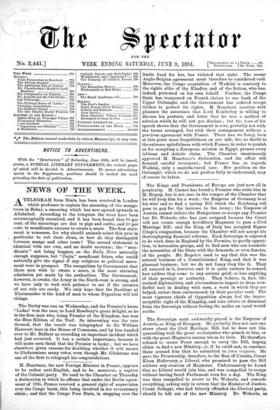The Kings and Presidents of Europe are just now all
in perplexity. M. Carnot has found a Premier who suits him in M. Dupny, but is not sure in the temper of the Chamber that he will keep him for a week ; the Emperor of Germany is at his wits' end to find a taxing Bill which the Reichstag will pass to pay for the increase to the Army ; the Emperor of Austria cannot induce the Hungarians to accept any Premier but Dr. Wekerle, who has just resigned because the Court will not create enough hereditary Magnates to pass a Civil Marriage Bill; and the King of Italy has accepted Signor Crispi's resignation, because the Chamber will not accept his thoroughgoing financial reforms. Each Sovereign is expected to do work done in England by the Premier, to pacify opposi- tion, to harmonise groups, and to find men who can reconcile the necessities of the State with the demands, or even fancies, of the people. Mr. Bagehot used to say that this was the natural business of a Constitutional King, and that it was pleasant business; but we do not fancy they like it. They all succeed in it, however, and it is quite curious to remark how seldom they come to any serious grief, or lose anything of their prestige or authority. They behave, in fact, like trained diplomatists, and circumstances impart to them won- derful tact in dealing with men, a work in which they are helped, rather than embarrassed, by their peculiar rank. The most vigorous chiefs of Opposition always feel the impre- scriptible right of the Kingship, and take rebuke or dismissal from the Sovereign without feeling the malice an equal would excite.






































